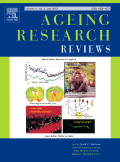
AGEING RESEARCH REVIEWS
Scope & Guideline
Unraveling the Complexities of Aging
Introduction
Aims and Scopes
- Age-related diseases and conditions:
The journal publishes research on various age-related diseases including Alzheimer's disease, Parkinson's disease, and cardiovascular conditions, exploring their pathophysiology, risk factors, and therapeutic strategies. - Mechanisms of aging:
AGEING RESEARCH REVIEWS focuses on the underlying biological mechanisms of aging, including cellular senescence, oxidative stress, and neuroinflammation, to understand how these processes contribute to age-related diseases. - Interventions and therapeutic strategies:
Research on lifestyle interventions, pharmacological treatments, and innovative therapies aimed at mitigating the effects of aging and improving health outcomes in older adults is a key focus area. - Psychosocial aspects of aging:
The journal covers the psychological and social dimensions of aging, including cognitive decline, mental health, and the impact of social determinants on the aging process. - Innovative research methodologies:
AGEING RESEARCH REVIEWS encourages the use of advanced methodologies such as machine learning, omics technologies, and systematic reviews to enhance the understanding of aging and its effects.
Trending and Emerging
- Multi-omics approaches:
There is a rising trend in the use of multi-omics strategies (genomics, proteomics, metabolomics) to understand the biological underpinnings of aging and age-related diseases, highlighting the complex interactions between different biological systems. - Digital health and technology:
The integration of digital health technologies, including telehealth, wearable devices, and artificial intelligence, is gaining traction as researchers explore their potential to enhance the management of aging and related health conditions. - Focus on frailty and resilience:
Research examining frailty as a critical aspect of aging, along with strategies to promote resilience in older adults, is increasingly prominent, reflecting a shift towards improving quality of life rather than just extending lifespan. - Gut-brain axis and microbiome research:
Emerging studies are highlighting the role of the gut microbiome in aging and its potential impact on neurological health, indicating a growing interest in the interplay between diet, gut health, and cognitive function. - Mental health and cognitive function:
An increased focus on the intersection of mental health, cognitive decline, and aging is observed, with research exploring interventions that address psychological well-being in older adults.
Declining or Waning
- Traditional pharmacological approaches:
There has been a noticeable decrease in studies focusing solely on traditional pharmacological treatments for age-related diseases, possibly due to a shift towards more integrative and holistic approaches that include lifestyle modifications. - Single-disease focus:
Research that examines aging solely in the context of individual diseases without considering comorbidities or the holistic aging process is becoming less common, as the field increasingly recognizes the interconnectedness of multiple health issues in older adults. - Basic science without clinical relevance:
There is a waning interest in basic science studies that do not have clear clinical applications or implications for aging research, as funding agencies and journals prioritize research with direct relevance to health outcomes. - Animal models of aging:
Research using traditional animal models for aging studies is declining, with a growing preference for human-centric studies that incorporate real-world data and clinical insights.
Similar Journals

Lancet Healthy Longevity
Transforming Aging Through Interdisciplinary CollaborationThe Lancet Healthy Longevity is a premier journal published by Elsevier that focuses on advancing our understanding of healthy aging and longevity through interdisciplinary research. Established in 2020, this Open Access journal is committed to disseminating innovative findings that enhance public and individual health, making it accessible to a global audience. The journal is proud to be recognized with a Q1 ranking in critical categories such as Family Practice, Geriatrics and Gerontology, Health (Social Science), and Psychiatry and Mental Health, indicating its prominent role in shaping contemporary discourse in these domains. As one of the leading titles within the field, it holds an influential position in Scopus rankings, with top placements in Geriatrics and Gerontology as well as Family Practice, thereby reaching the 99th percentile of scholarly impact. The Lancet Healthy Longevity aims to foster collaboration among researchers, healthcare professionals, and policymakers to promote healthy longevity, ultimately supporting the growing aging population worldwide. With its commitment to high-quality research and global accessibility, this journal is a vital resource for those dedicated to improving health outcomes across the lifespan.

GeroScience
Catalyzing Collaboration in Aging StudiesGeroScience, published by Springer, is an esteemed open-access journal that focuses on the multidisciplinary field of aging research. Since its inception in 2017, the journal has quickly established itself as a leader in its field, achieving impressive Q1 quartile rankings across various categories, including Aging, Cardiology and Cardiovascular Medicine, Geriatrics and Gerontology, and Complementary and Alternative Medicine, as per 2023 evaluations. With a significant impact factor that underscores its influence and reach in academia, GeroScience aims to disseminate high-quality research that addresses the complex challenges and advancements related to aging. Its accessible publication format fosters greater dissemination of knowledge and encourages collaboration among researchers, practitioners, and students eager to contribute to the growing body of work on age-related health issues. As it continues to thrive, GeroScience remains a pivotal resource for anyone looking to stay at the forefront of aging research.
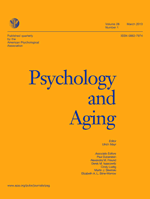
PSYCHOLOGY AND AGING
Fostering innovation in the psychology of aging.Psychology and Aging, published by the American Psychological Association, is a premier journal dedicated to advancing the field of psychology as it relates to aging. ISSN 0882-7974 and E-ISSN 1939-1498, this esteemed journal has been a key resource since its inception in 1986 and continues to shape the discourse surrounding aging-related psychological phenomena. The journal boasts impressive rankings in various academic categories, placing in Q2 for Aging, Q1 for Geriatrics and Gerontology, and Q1 for Social Psychology in 2023, highlighting its significance in multiple disciplines. With Scopus rankings that position it within the top tier of psychology and medical journals, Psychology and Aging serves as a vital forum for researchers, professionals, and students alike, facilitating the exchange of rigorous empirical research and novel theoretical insights. This journal is instrumental in elucidating the complexities of psychological function across the lifespan, ultimately contributing to improved interventions and policies affecting older adults.
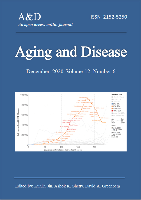
Aging and Disease
Fostering collaboration for a healthier aging population.Aging and Disease is a leading open-access journal published by the International Society on Aging and Disease, dedicated to advancing the understanding of aging and its associated diseases. Since its inception in 2010, the journal has established itself as a vital resource for researchers and practitioners in the fields of Geriatrics, Neurology, Cell Biology, and Pathology. With an impressive Q1 ranking across multiple categories and a robust position in Scopus rankings, including ranks in the top 3% in Geriatrics and Gerontology, it showcases high-quality research that addresses the complexities of aging processes. Each issue presents original articles, reviews, and insights aimed at improving health outcomes for the aging population. The open-access model ensures that valuable research findings are readily available to a global audience, fostering collaboration and innovation. As a go-to publication for scholars, healthcare professionals, and students, Aging and Disease significantly contributes to the multidisciplinary dialogue surrounding aging and its health implications.

Aging-US
Transforming Insights into Aging and HealthAging-US is a premier peer-reviewed journal dedicated to advancing the field of aging research and cell biology. Published by IMPACT JOURNALS LLC, this journal serves as a vital resource for researchers and professionals exploring the biological mechanisms of aging and their implications for health and disease. With a commendable impact factor reflected in its 2023 Scopus rankings, where it stands at Rank #10/38 in the category of Aging and Rank #63/285 in Cell Biology, Aging-US exemplifies rigorous scientific excellence. Its open access policy enhances accessibility, fostering a wider dissemination of knowledge in both academic and clinical settings. Spanning from 2009 to 2024, the journal provides a platform for groundbreaking studies and innovative methodologies, ensuring that it remains at the forefront of the dynamic conversations surrounding aging and cellular biology. Engage with Aging-US to contribute to the evolving narratives of longevity and cellular health.

Aging Medicine
Advancing Insights for a Healthier Aging PopulationAging Medicine, published by Wiley, is a pivotal open-access journal that has been at the forefront of research dedicated to the aging population since its inception in 2018. With a focus on both geriatric care and gerontology, the journal serves as a crucial resource for researchers, healthcare professionals, and students interested in understanding the complexities of aging and the related medical challenges. Although it holds a Q3 quartile ranking in the fields of Aging and Geriatrics and Gerontology according to the 2023 metrics, the journal continues to effectively disseminate valuable research and insights, helping to bridge gaps in knowledge and practice. With an E-ISSN of 2475-0360, it offers an open-access model that ensures broader accessibility to its published content, thus promoting collaboration and innovation across disciplines. As the journal converges towards 2024, it remains committed to evolving with the dynamics of aging research, making it a significant platform for the exchange of ideas and advancements in this essential field.
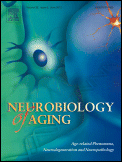
NEUROBIOLOGY OF AGING
Exploring the Intersection of Aging and NeurobiologyNEUROBIOLOGY OF AGING, published by Elsevier Science Inc, is a premier journal dedicated to advancing our understanding of the complex interactions between the aging process and neurobiological mechanisms. With an ISSN of 0197-4580 and E-ISSN 1558-1497, the journal has established itself as a critical resource in the fields of Aging, Developmental Biology, Geriatrics and Gerontology, Clinical Neurology, and Neuroscience. Boasting a Q1 ranking in multiple categories, the journal is positioned within the top echelons of scholarly publication, underscoring its significant impact with an impressive Scopus ranking in various subfields. Committed to disseminating high-quality, peer-reviewed research, NEUROBIOLOGY OF AGING welcomes original articles, reviews, and research notes aiming to uncover the underlying processes of aging on the nervous system, fostering collaboration among researchers, professionals, and students alike. Although primarily subscription-based, the journal continues to play a vital role in shaping the discourse on aging and neurobiology, making it an essential publication for those engaged in this dynamic field.

CELL
Connecting researchers with groundbreaking molecular insights.CELL is a premier academic journal in the field of Biochemistry, Genetics, and Molecular Biology, published by CELL PRESS. Founded in 1974, this esteemed journal has steadfastly contributed to advancing our understanding of cellular processes and organisms, making it integral for researchers and practitioners alike. With an impressive impact factor that places it in the Q1 category of its field, CELL ranks #1 out of 221 in general biochemistry and genetics, achieving a remarkable 99th percentile in Scopus rankings. Though it is not currently an open-access publication, the journal regularly disseminates high-quality research that impacts the scientific community significantly. Researchers, students, and professionals seeking to stay at the forefront of innovative discoveries and methodologies in molecular biology will find CELL an invaluable resource through its comprehensive articles and reviews.

Frontiers in Aging
Innovating the Future of Aging ScienceFrontiers in Aging is a leading academic journal published by FRONTIERS MEDIA SA, dedicated to advancing the understanding of the biological processes associated with aging. Established in 2020, this open-access journal aims to bridge the gap between various disciplines including genetics, molecular biology, and physiology, providing a multidisciplinary platform for researchers and clinicians alike. With a notable impact factor denoted by its Q2 quartile rankings in Aging, Genetics, and Molecular Biology, and a Q1 ranking in Physiology as of 2023, the journal is recognized for its contribution to the scientific community. Located in Lausanne, Switzerland, it is committed to promoting open discourse and publishing cutting-edge studies that address the complexities of aging and its implications for health and longevity. The journal’s editorial board, consisting of leading experts, ensures the rigorous peer-review process, maintaining high academic standards and fostering innovation in aging research.
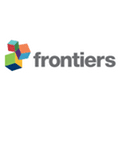
Frontiers in Aging Neuroscience
Advancing Knowledge for a Healthier Brain in Old Age.Frontiers in Aging Neuroscience, published by FRONTIERS MEDIA SA, is a leading open-access journal dedicated to the field of aging neuroscience, with its ISSN being 1663-4365. Since its inception in 2009, this journal has provided a platform for researchers to disseminate their findings on the neurological aspects of aging, addressing critical issues that impact cognition and overall brain health in the elderly population. With a commendable 2023 impact factor, the journal ranks in the Q2 category in both Aging and Cognitive Neuroscience, positioning it among the top-tier publications in these fields. Notably, it is recognized within Scopus, ranking #32 out of 115 in Neuroscience (Cognitive Neuroscience) and #20 out of 38 in the Aging sector, with corresponding percentiles of 72nd and 48th, respectively. As an open-access journal, it promotes unrestricted access to research findings, fostering collaboration and innovation among the academic community. Researchers, professionals, and students alike can explore cutting-edge studies that contribute to understanding the complexities of neurological aging and work towards improving cognitive health in an aging society.